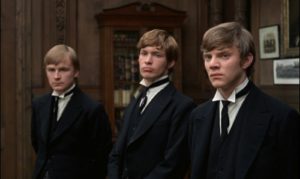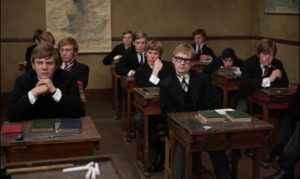 Attend: Program Notes
Attend: Program Notes
If…. | Lindsay Anderson | UK | 1968 | 112 minutes
Cinesthesia, Madison Public Library Central Branch, Thursday, March 1, 6:30pm»
In his Cinesthesia program notes, Jason Fuhrman explains how If…., Lindsay Anderson’s controversial and surreal portrait of boarding school life, overcame many obstacles to reach British screens and became an essential film of the 1960s.
Set in a British male boarding school at the tail end of the sixties, Lindsay Anderson’s If…. chronicles the exploits of three nonconformist senior classmen. Led by the mischievous Mick Travis (Malcolm McDowell), the students commit various acts of resistance, while being repeatedly subjected to harsh punishments and indignities. Their revolt against this institution continues to escalate until the film culminates in an absurd and unforgettable climax.
Anderson dissolves the boundaries between reality and imagination as he portrays an insular world of rigid authority with scrupulous attention to detail, a dark sense of humor, and surrealistic flourishes. Exciting and unpredictable in form and content, If…. endures as a landmark of British countercultural cinema and a bold, incisive work of art in its own right.
From the very start, when Mick Travis appears wearing a long black topcoat, wide-brimmed black hat, and black muffler across the lower half of his face, a sense of heightened reality pervades the film. Anderson conveys his story through what he terms “an atmosphere of poetic license.” The minute facts of daily life in the British public-school system (i.e. the slang, rituals, and affectations) are socially accurate, but If…. goes beyond pure naturalism to penetrate the deeper reality of its particular world.
“There’s nothing quite like a work of art that captures the zeitgeist right at its moment of maximum impact,” critic David Ehrenstein notes in his essay on the film. “And more than any other film of its time, If…. nails the sixties.”
Anderson was still working on the final script with screenwriter David Sherwin when student rebellions erupted at the Sorbonne in Paris and Columbia University in New York. If…. certainly exemplifies the widespread political unrest that arose as the film was shot. In a mock interview with himself from the original publicity campaign for If…., the director ponders how he and Sherwin “were being, to some extent, prophetic . . . forecasting the things to come—the conflict between established tradition and youthful independence that is evidently breaking out all over the world.”
 However, the primary purpose of the film was artistic rather than polemical. In the words of Anderson, “I would hope that it’s an experience, not an illustration.” If…. depicts the English educational establishment as a microcosm of the social system, while using this peculiarly hierarchical structure to dramatize issues of tradition, authority, freedom, and responsibility. Although the film undoubtedly reflects the general outlook of the period, If…. stands out among other countercultural movies. For instance, the film avoids specific references to current events. There are no consciousness-expanding substances. The schoolboys wear stylized costumes redolent of privilege, opulence, and self-satisfaction. And in lieu of pop music on the soundtrack, we hear the Latin mass sung in traditional Congolese style.
However, the primary purpose of the film was artistic rather than polemical. In the words of Anderson, “I would hope that it’s an experience, not an illustration.” If…. depicts the English educational establishment as a microcosm of the social system, while using this peculiarly hierarchical structure to dramatize issues of tradition, authority, freedom, and responsibility. Although the film undoubtedly reflects the general outlook of the period, If…. stands out among other countercultural movies. For instance, the film avoids specific references to current events. There are no consciousness-expanding substances. The schoolboys wear stylized costumes redolent of privilege, opulence, and self-satisfaction. And in lieu of pop music on the soundtrack, we hear the Latin mass sung in traditional Congolese style.
The odyssey of writing, shooting, and getting If…. released took eight years. In the end, it was only by a fluke that the film even played in theaters at all.
Sherwin describes this difficult battle in his published diary Going Mad in Hollywood: And Life with Lindsay Anderson. He and his friend John Howlett wrote the original screenplay, which was titled Crusaders. They sent copies of the script to a London agent named Margaret Ramsay, film producer Lord Brabourne, and Nicholas Ray, the director of Rebel Without a Cause. Ramsay told Sherwin that it would never be a film but may be a documentary. Lord Brabourne frankly declared: “Crusaders is the most evil and perverted script I’ve ever read. It must never see the light of day.” Ray agreed to meet Sherwin to discuss Crusaders, but he felt a British director was required to make the film. Soon afterward, Ray suffered a (presumably unrelated) nervous breakdown.
As a last resort, Sherwin sent Crusaders to film noir director Seth Holt, who considered producing the project at first and finding someone else to direct. Anderson read the script and met with Sherwin about it. The director of This Sporting Life (1963) thought the script was “too sentimental” and needed “to be freed, to be more poetical.” He was not interested in making a film that, as originally conceived, was a straightforward protest against injustice. Thus, Sherwin and Anderson completely reworked Crusaders.
Initially, every film company turned them down. But then Albert Finney and Michael Medwin’s production company, Memorial, took on the script and CBS agreed to finance Crusaders in 1967. Anderson’s alma mater, Cheltenham College, gave permission to shoot the film in their buildings. Understandably reluctant to show them the script, Sherwin typed a fake script for the headmaster. He couldn’t think of a title for this faux version, so he asked Daphne Hunter, Finney’s secretary, if she could think of something “really old-fashioned and corny.” She came up with Rudyard Kipling’s “If—,” a poem he wrote in 1908 that prescribes his formula for manhood: “If you can keep your head when all about you / Are losing theirs and blaming it on you . . . you’ll be a Man, my son!” Hence Crusaders became If…..
Unfortunately, CBS withdrew from the production. Paramount in London also turned down If….. But then, in a surprising turn, Charles Bludhorn, billionaire owner of the oil conglomerate Gulf and Western, acquired Paramount. Mrs. Bludhorn happened to be a huge fan of Albert Finney, who was in Peter Nichols’ 1967 play A Day in the Death of Joe Egg in New York. One thing led to another. All of a sudden, If…. was financed by Paramount. According to Sherwin, “neither of the Bludhorns ever read the script.”
Shooting started in March 1968 and Anderson had completed his final cut of If…. by October. Shocked, Paramount tried unsuccessfully to sell it to an American art-house chain. However, Paramount were told they had not fulfilled their Eady quota for the year. A certain number of films shown in Britain had to be British, and ten cans of a British film were sitting on a shelf. Furthermore, Barbarella was a flop at their West End cinema, so Paramount decided to replace it. If…. finally opened on December 19, 1968. The film was a box-office phenomenon and went on to win the Palme D’or at the 1969 Cannes Film Festival.
 If…. caused controversy at the time because of its apparently ambivalent attitude toward violence, even though the film’s ending looks completely unrealistic. While some commentators saw If…. as a dangerous, incendiary work of art that could potentially incite violence, the film was clearly never meant to be interpreted literally. “The work is not a propagandist one,” Anderson insists. “It doesn’t preach. It never makes any kind of explicit case.” Rather than offering glib and easy answers, Anderson poses challenging questions as he imagines an extreme situation that has profound implications for society and human existence in general. He presents two incompatible forces and contemplates the inevitable result of their sustained juxtaposition.
If…. caused controversy at the time because of its apparently ambivalent attitude toward violence, even though the film’s ending looks completely unrealistic. While some commentators saw If…. as a dangerous, incendiary work of art that could potentially incite violence, the film was clearly never meant to be interpreted literally. “The work is not a propagandist one,” Anderson insists. “It doesn’t preach. It never makes any kind of explicit case.” Rather than offering glib and easy answers, Anderson poses challenging questions as he imagines an extreme situation that has profound implications for society and human existence in general. He presents two incompatible forces and contemplates the inevitable result of their sustained juxtaposition.
Of course, it is nearly impossible to watch If…. today without thinking of the recent wave of school shootings throughout the U.S. Nevertheless, contemporary viewers should attempt to consider the film within its proper historical, cultural, and aesthetic context.
While If…. encapsulates the radical spirit of the sixties, the film continues to resonate almost fifty years later. A timeless examination of universal issues, If…. remains relevant precisely because it does not advocate for any specific cause. Anderson’s poetic method also imbues the film with a dreamlike quality that transcends its anti-establishment themes. His strange vision of British society amounts to something more complex and revolutionary than just a stylish attack on authority, as he clarifies in the interview:
The film is, I think, deeply anarchistic. People persistently misunderstand the term anarchistic and think it just means wildly chucking bombs about, but anarchy is a social and political philosophy which puts the highest possible value on responsibility. The notion of somebody who wants to change the world is not the notion of an irresponsible person.
In his biography Mostly About Lindsay Anderson, lifelong friend and colleague Gavin Lambert writes of his principal subject, “His films, like Buñuel’s, are gauntlets thrown to the audience.” If…. dares us to see things not as they appear, but how they really are, and asks us point-blank: “Which side will you be on?”